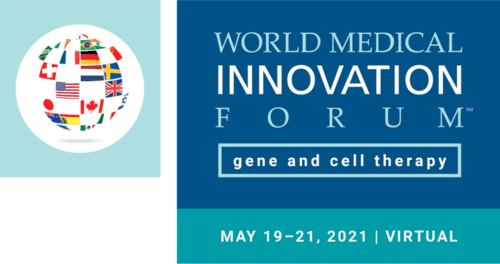
This morning’s Diabetes: Grand Challenge Panel at the World Medical Innovation Forum was a unique event for the T1D community. Three well-known competitors developing stem cell solutions for T1D – ViaCyte, Vertex, and Sigilon – shared the stage and reported on their progress.
The purpose of the panel was to discuss how recent breakthroughs in gene and cell therapy will influence the future of pancreatic islet cell transplantation. Representatives from the three companies discussed their different approaches, all of which have the potential to become a T1D Practical Cure.
- ViaCyte, represented by Dr. Manasi Jaiman, Vice President, Clinical Development, is a San Diego-based regenerative medicine company backed by hundreds of millions of dollars in venture capital funding. It is currently conducting a trial in which patients are implanted with stem cells that grow into pancreatic islet cells within an immunoprotective device.
- Vertex, represented by Dr. Bastiano Sanna, EVP, Chief of Cell & Gene Therapies, is a Boston-area company that recently acquired Semma Therapeutics and, along with it, a stem cell capability to make insulin-producing islets. It began testing those cells in high-risk T1D patients earlier this year.
- Sigilon, represented by Dr. Rogerio Vivaldi, CEO, is working with Eli Lilly to develop a novel encapsulation technology and a line of islets derived from stem cells. Sigilon has not yet moved their T1D-related work into human trials.
- Dr. Tom Bollenbach, Chief Technology Officer at the Advanced Regenerative Manufacturing Institute, brought to the panel his expertise in the many manufacturing challenges of making bioengineered products at a mass-market scale.
Vertex, Viacyte, and Sigilon offer the hope of providing a nearly indefinite supply of insulin-producing cells. If these cells could be mass-manufactured and also protected from any kind of immune response, the 24-hour a day burden of administering insulin and checking blood glucose would go away, and people with T1D would finally have a Practical Cure (referred to by the panelists as a “functional cure”).
However, none of the panelists put a stake in the ground to declare when this treatment would be available. Instead, the discussion focused on current hurdles in the field and possible approaches to overcome them.
Key Points:
- There was no specific timeline announced for ViaCyte's, Vertex's, or Sigilon's stem cell-derived islets to be available to people with T1D.
- Of the companies represented on the panel, ViaCyte has the most experience testing its cells in human trials: it has been doing so since 2014. Vertex began its first islet cell transplantation trial earlier this year, and Sigilon's cell solution remains in preclinical development.
- The discussion brought to light differences in the approaches of Viacyte and Vertex.
- ViaCyte's cells are "pancreatic progenitor cells" which develop over time into insulin-producing cells after being implanted into the body. The benefit of this approach, according to Jaiman, is that the cells are better accepted by the host.
- Vertex's cells are fully mature and ready to go, capable of producing insulin just days after being implanted. The benefit of this approach, according to Sanna, is that the engineered cells are more predictable and closer to the beta cells that exist in nature.
- ViaCyte has an active human trial testing a device (co-produced by the company that invented Gore-Tex technology) that could protect their islet cells from the T1D autoimmune attack. It also has a partnership with CRISPR Therapeutics to use gene editing to create a line of immune evasive islet cells.
- Vertex's current human trial requires patients to take full-body immunosuppressive drugs to protect the cells from immune attack. Dr. Sanna clarified that "obviously, immunosuppression is not the end game," and the company is working on "developing a new concept of encapsulation."
- There was a panel-wide agreement that the treatment is largely safe in response to a question about whether stem cell-derived islets could cause tumors. Regardless, the clinical trial process will sort out any safety concerns before this therapy is approved for the general public.
- Three out of four panelists stated a belief that the main barrier to making islet cell transplantation available to everyone is scaling up the production, maintaining consistency and quality – a capability that is currently not yet in place. Such a capability is required to deliver a mass solution and to ensure that pricing is not prohibitive.
